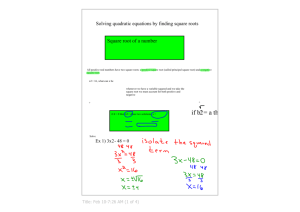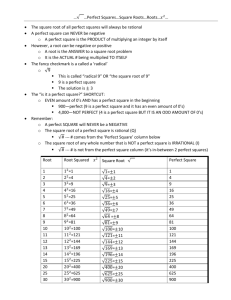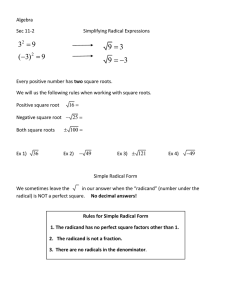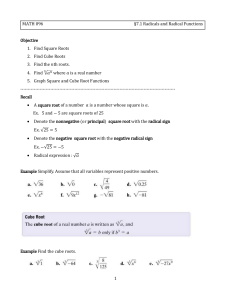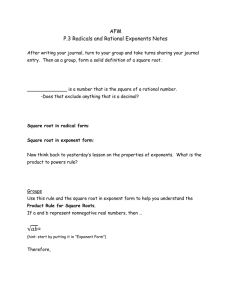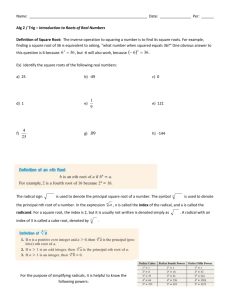square root - Mrs. Andrews' CBA classes
advertisement
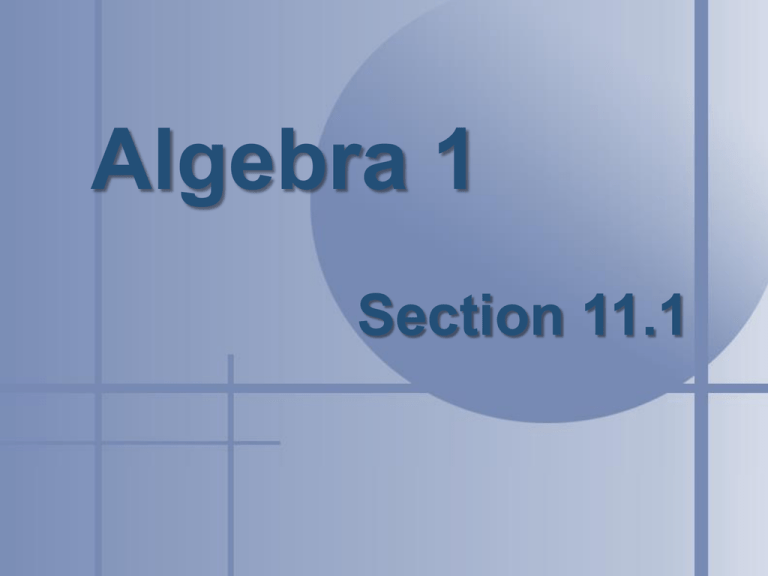
Algebra 1 Section 11.1 Square Roots Squaring a number and taking the square root of the result are similar to inverse operations, such as addition and subtraction. The square roots of 9 are 3 and -3. Definition A square root is one of a number’s two equal factors. The symbol for a square root is the radical sign, . Definition The expression under the radical sign is called the radicand. Square Roots The square root of 9 has two values: ±3. To avoid confusion, we use the radical sign to indicate the positive square root, called the principal root. Square Roots If the negative square root is desired, a negative sign is placed in front of the radical sign. 9 =3 - 9 = -3 Example 1 4 =2 - 16 = -4 Roots To indicate roots other than square roots, an index is added to the radical sign. Index n Definitions 3 A cube root, , is one of a number’s three equal factors. n An nth root, , is one of a number’s n equal factors. If 23 = 8, then 3 8 = 2. Example 2 3 4 125 = 3 53 = 5 81 = 4 34 = 3 Roots The even root of a negative number is not a real number since any number to an even power is positive. The odd root of a negative number is a negative real number. Example 3 a. b. c. -4 is not a real number. 3 - 27 125 5 = -32 = 3 5 3 3 =-3 -( 5 ) 5 (-2)5 = -2 Rational and Irrational Numbers While some radicals are rational numbers, many radicals are irrational numbers. Irrational numbers are nonrepeating, nonterminating decimals. Rational and Irrational Numbers Irrational numbers can be either stated exactly as radicals or approximated by rounding to a designated decimal place. Approximation Since 4 < 7 < 9, 4 < 2 < 7 < 9 7 < 3 7 ≈ 2.645751311 7 ≈ 2.65 Example 4 121 < 129 < 144 Therefore, 11 < 129 < 144 And on a calculator, 129 ≈ 11.36 Example 5 27 < 50 < 64 Therefore, 3< 3 50 < 4 And on a calculator, 3 50 ≈ 3.684 Roots and Radicals The definitions of roots and powers allow you to convert an equation from exponential to radical form and vice versa. In general, bn = a is equivalent n to a = b. Roots and Radicals The definition of exponents is not limited to integers. You can convert between the radical form and the exponential form of any expression by using the following definition. Definition The exponential expression is equivalent to the radical b a b x or ( x )a . b a x Example 6 5 2 3 = 5 3 x = 3 52 3 x5 3 = 25 Example 7 1 32 4 3 x4 = 2 34 7x3y2 = 3 x4 1 74 = 4 32x3 3 2 x4y4 = = 1 74 4 9x3 3 1 x4y2 Homework: pp. 435-436
